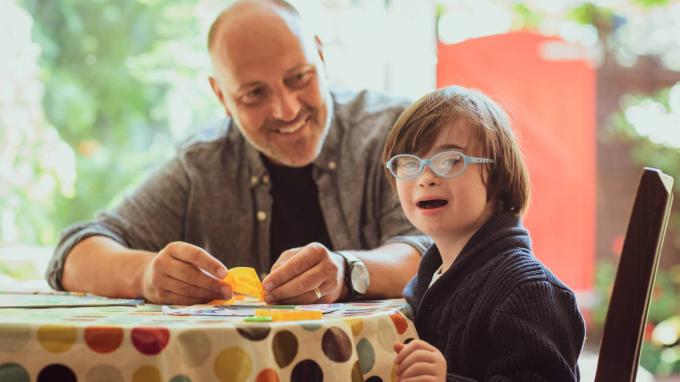12-year-old Libby lives with her parents and older brother in Rochdale. Both Libby and her older brother are autistic, and Libby has faced some problems with people not understanding her way of thinking. Her mum, Emma, explains how everything changed for Libby once she started going to one of our art clubs.
Growing up for Libby
Emma knew that Libby had additional needs from quite early on in her childhood. Libby’s older brother is autistic, so she knew the signs to look out for. “Both my children have autism, but they are both very different. Libby is very sociable and wants to be everyone’s friend whereas my son is less sociable and doesn’t like to talk to people too much.”
“When she was growing up at home, Libby would love to sing songs and nursery rhymes, but there was a time when I took her to a baby group at our local library and she was really quiet. She wouldn’t interact with anyone, and she just wanted to leave. That was the point when I thought for sure that Libby had additional needs – my ‘mum instincts’ were flying all over the place!”
“We call Libby our wild child. She’s a rule breaker and life’s never uninteresting with her. She is quite unaware of personal space and struggles to maintain friendships with other children – mainly because she can be quite ‘in-your-face’ and as she’s grown older, her autistic traits have become more apparent.”
“With Barnardo’s, she’s herself and she can just breathe”
Emma and Libby first got involved with us about three years ago, when a different charity referred Libby to our Rochdale SENDIASS service. That’s when Libby got a place at an art club.
“At that point, life suddenly changed for her,” Emma says.
At the art club, she had a space to be herself, whereas at school she was always trying to be ‘normal’ and not show her autistic traits. But with Barnardo’s, she’s herself and she can just breathe.
Emma
Libby's mum
“I can’t fault the staff at Barnardo’s in any way. If Libby’s had a bad time at school or anything like that, the staff are always there to lift her spirits and take care of her.”
“She generally comes out of the art club much happier than when she arrived.”
“The art club allows her to be sociable as well. Sometimes, she comes home and shows me things she’s made, or other times she’s just been socialising. But for Libby, it’s a space where she’s completely herself and none of the staff or the other kids bat an eyelid at her.”
“Barnardo’s supports Libby in whatever way she needs supporting. She looks forward to Thursday every week because that’s when she goes to art club. She counts down the days until she can go!”
Why it’s important for neurotypical people to learn about neurodiversity
Emma wants neurotypical people to know that neurodiverse children are still children – even though they might see or do things differently, they should still be able to enjoy their lives and contribute to society just like everyone else.
“I think it’s important to recognise that we are all the same,” she says. “Even though we might appear or think differently, we can all still contribute to society in a positive way.
I would love to see more opportunities out there for neurodiverse children, like the art group that Barnardo’s runs. Groups like that provide Libby with consistency and opportunities to socialise, which is so important for her.
Emma
Libby's mum
“Libby sometimes uses a wheelchair because of her hypermobility, and people sometimes talk to me instead of her like she isn’t even there. Her legs might not work as well as other peoples’, but there’s nothing wrong with her mind and she can talk your ear off! I just wish people would talk to her as a person instead of talking to me when she’s right there,” Emma says.
“It’s important not to judge outwardly based on what you see”
“Last year, when Libby was in her final year of primary school, things about her appearance that made her stand out from other girls became more noticeable. And some of the girls in her class would push Libby’s chair away from them, wouldn’t talk to her and would run away.”
“It was amazing how Libby dealt with that. She spoke to all of the girls and explained why she did the things she did that weren’t quite the same as them, and she educated them onto her level.”
It’s important not to judge outwardly based on what you see, she’s still a little girl with feelings at the end of the day.
Emma
Libby's mum
“She was 11 years old, but she knew that it was better to educate them rather than get them told off by the teacher. When the teacher told me, I couldn’t believe it! She didn’t want them to be in trouble, she just wanted them to understand her.
“That’s why education and awareness around neurodiverse people, and especially children, is so important.”

Support for children with special educational needs and disabilities
We offer a range of support for children with special educational needs and disabilities and their families.

"They're a joy to work with": How a Barnardo’s worker supports autistic children and their families
Read this interview with Louise Godfrey, a Barnardo's Team Leader at Surrey Positive Parenting Service, about her work with autistic children and their families.

Autism and mental health
Just like any young person, if you have autism, it’s important to look after your mental health.

